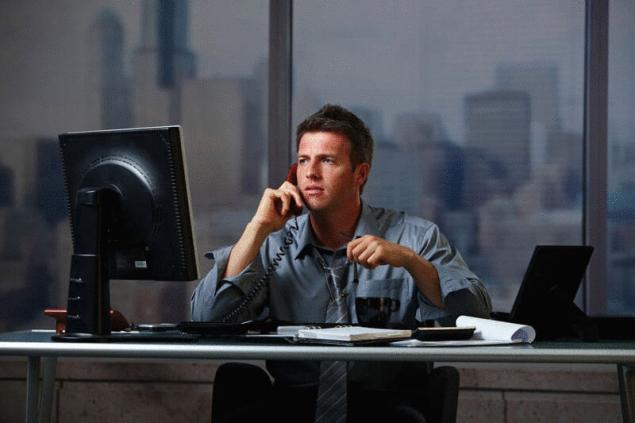485
What makes successful people in the last 10 minutes of your working day
The right end of the working day success you May spend the last 10 minutes of the workday, not taking his eyes from the clock, counting the seconds until the moment when you'll be free.
Or maybe, with the head immersed in the work until the very last minute, and then grab their stuff and go, with no one saying goodbye.
If one of these scenarios sounds familiar, perhaps it is time to reconsider the tradition of the end of the working day.

Michael Kerr, an international business expert and author of "Enough of the seriousness! Add a little humor to the work" (You Can't Be Serious! Putting Humor to Work), says:
"It's very important how you finish the workday. This can determine your mood for the rest of the day; it can affect your personal life, overall happiness, quality of sleep, and sets the tone for the next day."
Lynn Taylor, an American expert on the organization of the jobs, wrote the book "Taming office tyrant: how to deal with Moody boss and succeed at work" (Tame Your Terrible Office Tyrant: How to Manage Childish Boss Behavior and Thrive in Your Job). She said that the most successful people usually make a plan of action to address current problems that can often focus on the events the next morning — both planned and unexpected.
1. They update the lists

Taylor mentions that successful professionals always follow the constantly changing to-do lists. She adds:
"However, in the last 10 minutes they also check to see how done put to day tasks. Such people appropriately change their final to-do list, and not abruptly quit my job, hoping that I could remember all the nuances of the next morning."
2. They tidy Desk and computer Implementation of projects takes much longer if you are disorganized. Taylor says:
"Chaos on the desktop and the computer interferes with clear thinking and effectively set priorities; it also complicates the search for relevant documents. Keep digital and paper documents in order to quickly find them when you need it".
3. They are reviewing completed works Taylor believes: we should not only concentrate on what has not yet been done, but to look at already completed work. Kerr agreed with her:
"Even a one minute analysis of the work performed is capable of giving the understanding of progress, and in particularly complex and overloaded the day it may be recalled, made much more than it seems. Psychological studies show that even a brief review of the work performed is a great way to improve mood".
4. They analyze ended day Successful people not only think about the projects handled during the day, but also trying to understand why something went according to plan, or Vice versa. Taylor says:
"Experienced professionals know that if they do not learn, not grow."
5. They reduce the amount of "urgent" talk You all day, but the letters and calls come in a continuous stream until the last minutes of the day. Taylor notes: "and here we can see the skills of time management — successful people can decide what needs urgent attention and what can wait."
Try to defer long conversations on important issues to the most productive time — that is, until the morning. Taylor advises:
"Think about whether you can postpone the discussion of important issues at a specific time the next day. Otherwise, the case could drag late, you and your buddies run out of power and you run out of time. This delay would also allow time to better consider the issue."
6. They stay focused Taylor says:
"As a rule, in the evening people think worse and it is difficult to concentrate".
Try to stay focused and not to get involved in foreign Affairs at the end of the day.
7. They define the tasks for the next day Successful people make a list of what the morning will be ready, and determine main tasks for the next day. Taylor advises:
"Maybe you have a couple of cases that is the focus, but it is better to record them to the next morning was a base to start work."
Kerr adds:
"The more thoughts you will be able to Express on paper, the higher the likelihood that you will be able to focus on life outside of work with a clear head and you will be ready to begin the next day."
8. They report, whether it is possible to communicate with them until the next morning the Most successful people analyze how much they will be free and will it be possible to contact them if necessary, and then talking about it to those who may need it. Kerr says:
"Go away whether you are in "total darkness" with a complete loss of communication with the office? Or make some exceptions? It depends on the situation, and the only correct answer does not exist. The most important question to ask yourself is: "How much am I willing to be available after hours to avoid disrupting my rest?""
9. They analyze the graph on the following day There's nothing worse than to start the day with the news that after five minutes you have a big meeting. Kerr says:
"Successful people know how to make a schedule and plan for the next day and — more importantly — to imagine how this day goes."
This allows you to get to work with more confidence and less stress.
10. They Express their gratitude for the support Good teams are built on the basis of gratitude and recognition. Kerr says:
"The habit of thanking someone at the end of the day is an incredibly effective way to improve your mood and complete your and someone else's day on a good note."
11. They wish colleagues a pleasant evening with a Friendly "good evening" is very underestimated and requires very little effort. Taylor says:
"It reminds your boss and employees that you are a live person and not just a colleague".
Besides this way, you focus attention of colleagues and leadership on what's left.
12. They leave on a positive note Before leaving, lift your spirits with a smile, recommends Taylor.
"This will prepare you to say goodbye to colleagues on a good note".
Successful leaders leave a positive impression at the end of the day, and it persists until the next morning.
13. They still leave Successful people overcome the temptation to stay longer. They know how important it is to balance work and personal life, so I try to leave the office very late. Taylor says:
"Stay on the job without a valid reason reduces your level of performance will be needed tomorrow."published
P. S. And remember, just changing your mind — together we change the world! ©
Source: insider.pro/EN/article/7544/
Or maybe, with the head immersed in the work until the very last minute, and then grab their stuff and go, with no one saying goodbye.
If one of these scenarios sounds familiar, perhaps it is time to reconsider the tradition of the end of the working day.

Michael Kerr, an international business expert and author of "Enough of the seriousness! Add a little humor to the work" (You Can't Be Serious! Putting Humor to Work), says:
"It's very important how you finish the workday. This can determine your mood for the rest of the day; it can affect your personal life, overall happiness, quality of sleep, and sets the tone for the next day."
Lynn Taylor, an American expert on the organization of the jobs, wrote the book "Taming office tyrant: how to deal with Moody boss and succeed at work" (Tame Your Terrible Office Tyrant: How to Manage Childish Boss Behavior and Thrive in Your Job). She said that the most successful people usually make a plan of action to address current problems that can often focus on the events the next morning — both planned and unexpected.
1. They update the lists

Taylor mentions that successful professionals always follow the constantly changing to-do lists. She adds:
"However, in the last 10 minutes they also check to see how done put to day tasks. Such people appropriately change their final to-do list, and not abruptly quit my job, hoping that I could remember all the nuances of the next morning."
2. They tidy Desk and computer Implementation of projects takes much longer if you are disorganized. Taylor says:
"Chaos on the desktop and the computer interferes with clear thinking and effectively set priorities; it also complicates the search for relevant documents. Keep digital and paper documents in order to quickly find them when you need it".
3. They are reviewing completed works Taylor believes: we should not only concentrate on what has not yet been done, but to look at already completed work. Kerr agreed with her:
"Even a one minute analysis of the work performed is capable of giving the understanding of progress, and in particularly complex and overloaded the day it may be recalled, made much more than it seems. Psychological studies show that even a brief review of the work performed is a great way to improve mood".
4. They analyze ended day Successful people not only think about the projects handled during the day, but also trying to understand why something went according to plan, or Vice versa. Taylor says:
"Experienced professionals know that if they do not learn, not grow."
5. They reduce the amount of "urgent" talk You all day, but the letters and calls come in a continuous stream until the last minutes of the day. Taylor notes: "and here we can see the skills of time management — successful people can decide what needs urgent attention and what can wait."
Try to defer long conversations on important issues to the most productive time — that is, until the morning. Taylor advises:
"Think about whether you can postpone the discussion of important issues at a specific time the next day. Otherwise, the case could drag late, you and your buddies run out of power and you run out of time. This delay would also allow time to better consider the issue."
6. They stay focused Taylor says:
"As a rule, in the evening people think worse and it is difficult to concentrate".
Try to stay focused and not to get involved in foreign Affairs at the end of the day.
7. They define the tasks for the next day Successful people make a list of what the morning will be ready, and determine main tasks for the next day. Taylor advises:
"Maybe you have a couple of cases that is the focus, but it is better to record them to the next morning was a base to start work."
Kerr adds:
"The more thoughts you will be able to Express on paper, the higher the likelihood that you will be able to focus on life outside of work with a clear head and you will be ready to begin the next day."
8. They report, whether it is possible to communicate with them until the next morning the Most successful people analyze how much they will be free and will it be possible to contact them if necessary, and then talking about it to those who may need it. Kerr says:
"Go away whether you are in "total darkness" with a complete loss of communication with the office? Or make some exceptions? It depends on the situation, and the only correct answer does not exist. The most important question to ask yourself is: "How much am I willing to be available after hours to avoid disrupting my rest?""
9. They analyze the graph on the following day There's nothing worse than to start the day with the news that after five minutes you have a big meeting. Kerr says:
"Successful people know how to make a schedule and plan for the next day and — more importantly — to imagine how this day goes."
This allows you to get to work with more confidence and less stress.
10. They Express their gratitude for the support Good teams are built on the basis of gratitude and recognition. Kerr says:
"The habit of thanking someone at the end of the day is an incredibly effective way to improve your mood and complete your and someone else's day on a good note."
11. They wish colleagues a pleasant evening with a Friendly "good evening" is very underestimated and requires very little effort. Taylor says:
"It reminds your boss and employees that you are a live person and not just a colleague".
Besides this way, you focus attention of colleagues and leadership on what's left.
12. They leave on a positive note Before leaving, lift your spirits with a smile, recommends Taylor.
"This will prepare you to say goodbye to colleagues on a good note".
Successful leaders leave a positive impression at the end of the day, and it persists until the next morning.
13. They still leave Successful people overcome the temptation to stay longer. They know how important it is to balance work and personal life, so I try to leave the office very late. Taylor says:
"Stay on the job without a valid reason reduces your level of performance will be needed tomorrow."published
P. S. And remember, just changing your mind — together we change the world! ©
Source: insider.pro/EN/article/7544/
Dissatisfaction: we Need to remember that it could be worse!
Psychosomatic correction by methods of osteopathy























